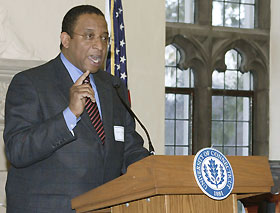Alumnus Randall Pinkston
Discusses Law, Morals, Reporting
 |
| Randall Pinkston, CBS Evening News corresponent and a Law School alumnus, speaks at the UConn Law School Feb. 22. |
|
Photo by Tina Covensky |
The scandal involving former White House reporter Jeff Gannon; the question of who will replace TV anchorman Dan Rather; and President George H.W. Bush’s embarrassing illness in Japan were a few of the topics CBS news correspondent Randall Pinkston discussed with students at the Law School during a talk Feb. 22.
The event was sponsored by the Black Law Students Association.
Pinkston, a 1980 graduate of the UConn School of Law, has covered many major stories during the past decade for CBS News, including the earthquake that devastated parts of Turkey in 1999, and both pre- and postwar Iraq.
Despite his journalistic successes, the many-time Emmy winner initially didn’t see himself as a reporter. He graduated from Millsaps College in Jackson, Miss., in 1973 with a bachelor’s degree in history, and decided to attend law school when he saw a clear connection between the law and the civil rights movement.
Growing up in Yazoo County, Miss., Pinkston experienced the segregated life common in the South at the time, and witnessed first-hand the heroism of people who challenged the system, he said.
He briefly attended Wesleyan University in Middletown, but his father’s death during his freshman year forced him to return to Mississippi.
“Sometimes your plan will not work,” he told the audience. “Then what do you do? You can get depressed, or you can focus on what is possible from where you are. You have to be open to the alternatives.
“Yes, plan,” he advised, “but know that plans can change and that, in some cosmic way, everything you do prepares you for your next step.”
Pinkston was hired, as one of the first beneficiaries of an affirmative-action hiring push, by radio station WLBT-TV in Jackson while he was still in college. That first job was a springboard for the rest of his career.
From 1976 to 1980, he held several positions at WFSB-TV3, the CBS affiliate in Hartford, including reporter, anchor, and producer of many public affairs programs.
In 1990, after working in New York at the CBS affiliate there, he joined CBS as a White House correspondent, spending nearly two years covering President George H.W. Bush’s trips abroad.
In January 1992, Pinkston used his ability to track down the truth about a rumor when he heard that a medic had been summoned to a dinner with Japanese Prime Minister Kiichi Miyazawa. Remembering that the president had earlier said he felt unwell, Pinkston followed the story and broke the news that Bush had fallen ill during a state dinner.
As a reporter who has worked within the White House, Pinkston knows how hard it is to gain access to certain information there. He said it seems unlikely that the government was unaware that the reporter who called himself “Jeff Gannon” was actually a man named James Guckert, whose photos had appeared on gay escort websites. He was a reporter with a conservative bent, and critics have charged that the White House ignored his real identity because of the pro-Bush slant of his reporting.
“You cannot say that the government is controlling information,” he said, “but this gives the appearance that they are bringing people in who will report their side of the story.”
Pinkston gave advice on morals, the law, and reporting.
Morals, he said, are something you learn from parents, teachers, and interactions with other people, and can play a part in a journalist’s life.
“There is a point in a reporter’s daily toil where he may be called upon to make a judgment on the side of decency,” he said, “as opposed to coverage.”
As for who will replace Dan Rather, if Pinkston knew anything, he wasn’t telling.
“There is talk of the newscast taking an alternate route,” he said, “but no one person has been named as of yet.”
Pinkston said he finds that his legal education gives him a good background for journalism.
“The law became background noise to me, a frame of reference I used,” he said. “It caused me to be skeptical, and to probe for facts and look for holes and gaps in each story.”

